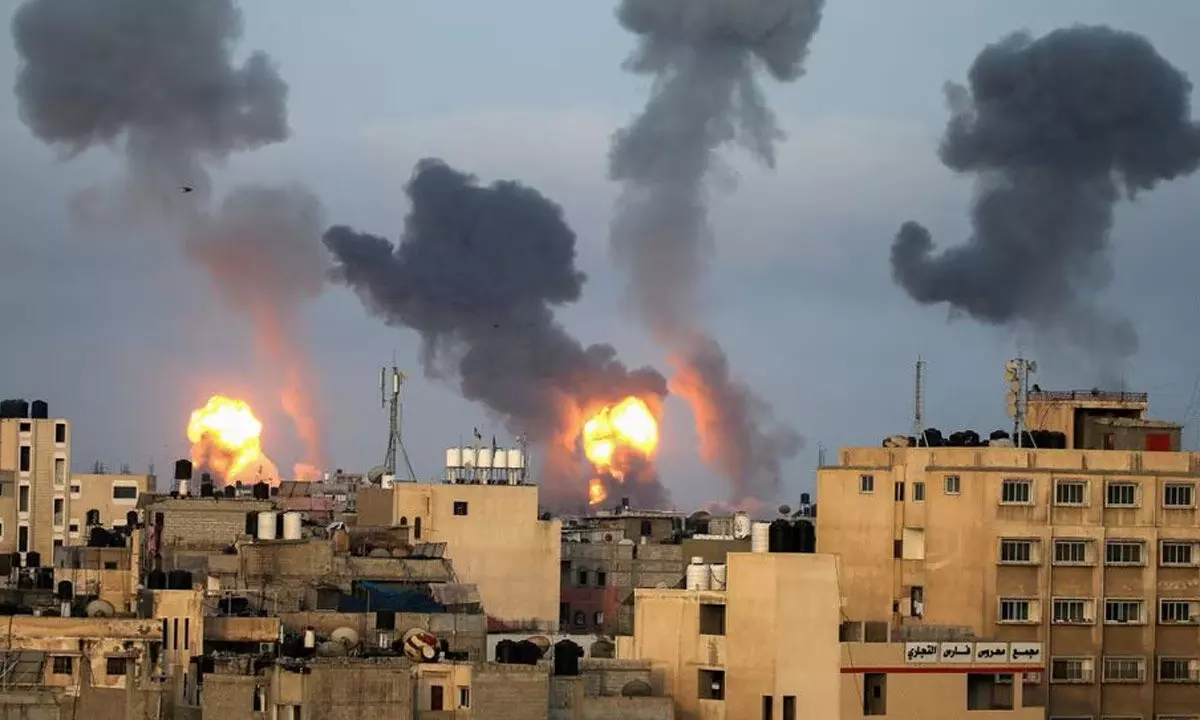Planning for day after raids a tougher task

For Israel, which has launched the second phase of its war, invading Gaza could become an adventure – or misadventure – like riding a tiger: the difficult part would be dismounting it
New York: For Israel, which has launched the second phase of its war, invading Gaza could become an adventure – or misadventure – like riding a tiger: the difficult part would be dismounting it. Announcing the second phase - a ground invasion - Israel’s Prime Minister Benjamin Netanyahu acknowledged on Saturday, “It will be long and difficult”.
Israel could quickly take over the territory if it wanted to, in a no-holds-barred, international opinion-be-damned operation. Netanyahu has set two goals for the war: “To eliminate Hamas by destroying its military and governing abilities, and to do everything possible to bring our captives home”. But he has not said what would happen after that.
A look at history will be a lesson in the ungovernability of Gaza.
Israel captured Gaza from Egypt in the 1948 Arab-Israel War, but gave it up as unmanageable. Egypt did not try to fully integrate it into itself and tried various ways of governing it till the 1967 war when Israel retook it. Egypt has not asked back for it.
Israel’s military hero Ariel Sharon when he became prime minister withdrew from Gaza in 2005 -- a second time for Israel -- dismantling the Jewish settlements there, hoping for peace with Palestinians, after Israel had virtually given up on governing it.
Within months, Hamas won the elections in Gaza and by 2007 it had fought a civil war with Fatah, vanquishing the organisation founded by Yasser Arafat the Palestinian leader who sought to make peace with Israel after decades of fighting it.
Fatah leader Mahmoud Abbas is the president of the Palestine Authority which is nominally recognised as the governing body of Palestine, but effectively rules only the West Bank, from which Gaza under Hamas has virtually split, creating another barrier to a two-state solution.
A likely reason for holding off the full-scale invasion after having mobilised reservists, ordered the people of Gaza to move south and rained down bombs and missiles is the question of what comes next. Another reason is the 200 or so hostages taken by Hamas can become human shields.
Yet another is the pressure from the US and its allies to minimise civilian casualties during the invasion. Writing in the liberal Israeli newspaper Haaretz, Michael Milshtein, who heads the Palestinian Studies Forum at the Moshe Dayan Center for Middle Eastern and African Studies, says a disastrous one advocated by Israel’s religious parties is the reoccupation of Gaza and bringing back Israeli settlements. It was found unworkable in the past.Another “terrible choice” is a quick, large-scale invasion that topples Hamas that is followed by a quick withdrawal, which Milshtein says would see other extremists from within and without taking over. One of the two “lesser of the evils”, he says would be to ask the Palestine Authority under Abbas that rules the West Bank to take over the Gaza administration.
But having been ousted from Gaza and finding it difficult to govern the West Bank that would bring its own set of problems.
The fourth alternative, which Milshtein says is a plan the Biden administration “is apparently discussing with Israel.”
That would be modelled on the Iraq provisional government structure set up by the US after it took over the country. It would be composed of local leaders and NGOs and the Fatah figures and would work with the Palestine Authority and have international backing and cooperation of the US and Egypt and possibly other Arab countries including Saudi Arabia.
Netanyahu’s administration telling the people of Gaza to move south in preparation for the invasion may be a signal that it wants to take over a northern part, but that could still leave Hamas dominating the southern rump.
The big risk for Israel is fighting a two-pronged war if Hezbollah joins in from Lebanon along Israel’s northern flank. Unrest in West Bank spilling over could add to the problems.
A full-scale invasion would only inflame the Arab nations further and set back the progress made in Israel building relations with Arab nations, especially with Saudi Arabia, the diplomatic prize Biden is seeking.
He said that his gut feeling is that Hamas launched the attack because of the progress we were making towards regional integration for Israel and regional integration overall.
That scenario is what Iran, the nemesis of Israel and the US, wants.










